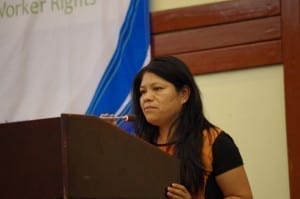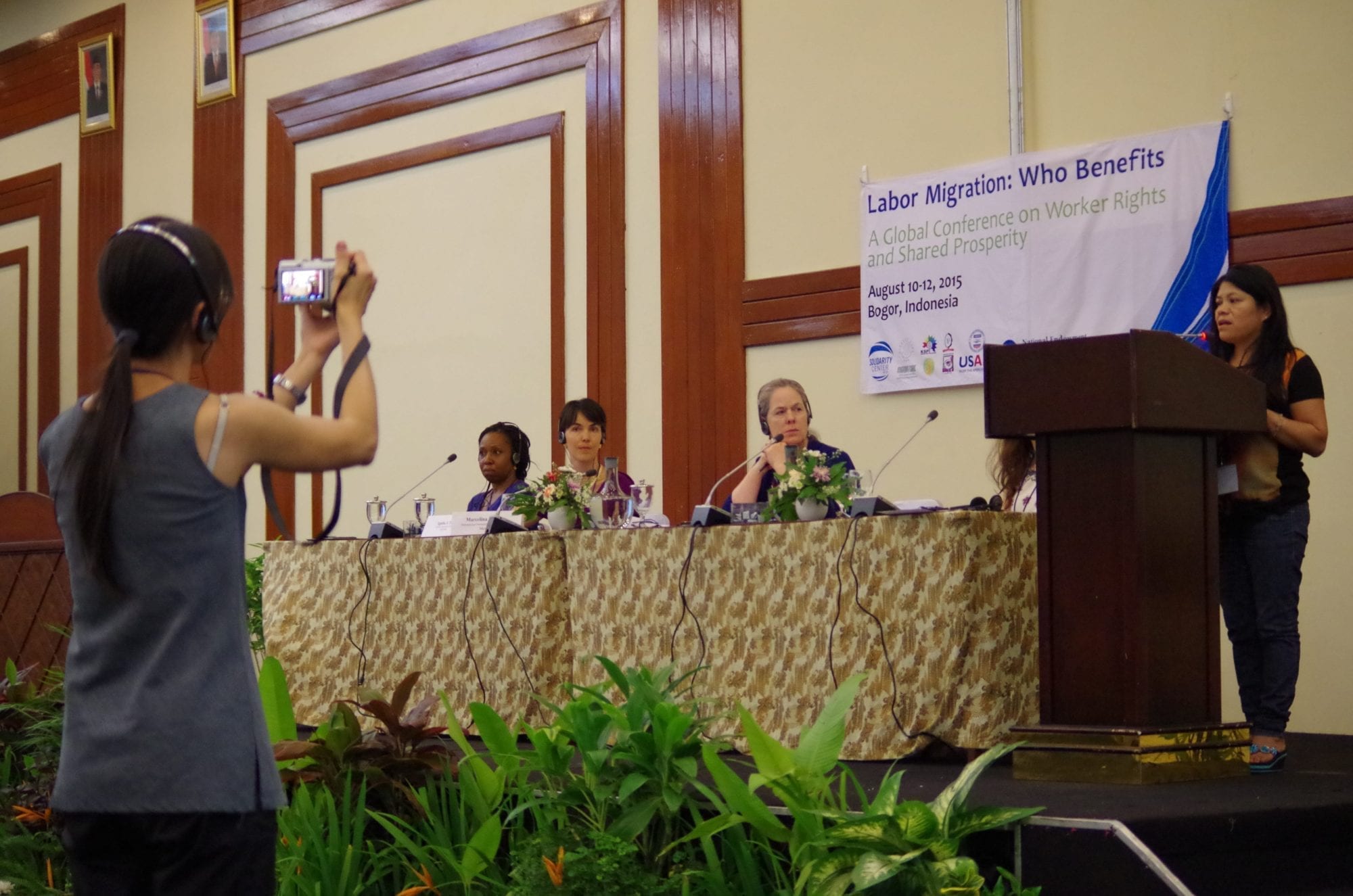Participants in Monday’s final session of the Solidarity Center labor migration conference engaged in a lively discussion with panelists in a discussion of migrant workers’ vulnerability to gender-based violence.
Lisa McGowan, senior specialist for gender equality, outlined the broad picture, pointing out that gender-based violence is “one of the most widespread human rights violations in the world,” and migrant workers are especially at risk of gender-based violence because they are often invisible.

“Domestic workers suffer violence for being women, migrants and indigenous people.”–Marcellina Bautista, leader of the Center of Support and Training for Domestic Workers.
Credit: Solidarity Center/Kate Conradt
Describing her work organizing and supporting domestic workers, many of whom are migrants, Marcellina Bautista, the leader of the Center of Support and Training for Domestic Workers (CACEH), said that “domestic workers suffer violence for being women, migrants and indigenous people.”
Bautista, who worked as a domestic worker for many years, says domestic workers encounter “all kinds of violence in the homes where we work.”
“The majority of the 2.3 million people in Mexico who do domestic work are women and girls” who are highly vulnerable to gender-based violence, says Bautista, who also serves as International Domestic Workers Federation (IDWF) regional coordinator for Latin America.
The CACEH works with domestic workers who face workplace violence, helping migrant workers understand that they have the same rights as other workers in Mexico.
Farm work is another sector where women workers are especially vulnerable to gender-based violence, and Agatha Schmaedick Tan discussed the Coalition of Immokalee Workers’ (CIW) efforts to end sexual harassment and violence among tomato pickers in Florida. Tan cited a study that found some 80 percent of female farmworkers had experienced sexual harassment at work in 2010.

“Sexual harassment on the job persists worldwide,” Agatha Tan, counsel for the Coalition of Immokalee Workers. Credit: Solidarity Center/Kate Conradt
Describing Immokalee, Florida, as “not a town, but a labor reserve,” Tan outlined CIW’s path breaking Fair Food Program, which CIW negotiated with growers and which 14 major corporations have signed. Under the code, which covers as many as 100,000 workers in a year, farms must comply with fundamental labor standards, including preventing violence and sexual harassment at work. Corporations agree to buy only from farms that comply, and auditors annually evaluate the farms. Some 90 percent of Florida tomato growers have signed on to the program.
“Sexual harassment and violence on the job is illegal in most countries, yet sexual harassment on the job persists worldwide due in part to the difficulties of enforcement,” she said.
Closing the panel, Chidi King, International Trade Union Confederation Equality Department director, told participants: “We as a labor movement have not done enough to bring (gender-based violence at work) to the fore of our agendas. We still see this as a personal issue,” not one to be dealt with at the organizational level.

Chidi King, ITUC Equality Department director, rallied participants to push for an ILO standard on gender-based violence at work. Credit: Solidarity Center/Kate Conradt
King noted that the ILO has not taken up gender-based violence because of resistance of “very regressive governments,” and urged participants to push the ILO to create a standard covering gender-based violence.
“When you’re talking about your organization’s activities, have this front and center. It cannot be an issue we continue to remain silent about.”
More than 200 participants are taking part in the Aug. 10-12 event, Labor Migration: Who Benefits? A Solidarity Center Conference on Worker Rights & Shared Prosperity.
Follow the conference on the website and on Twitter @SolidarityCntr.

